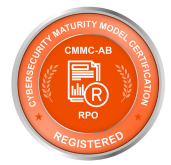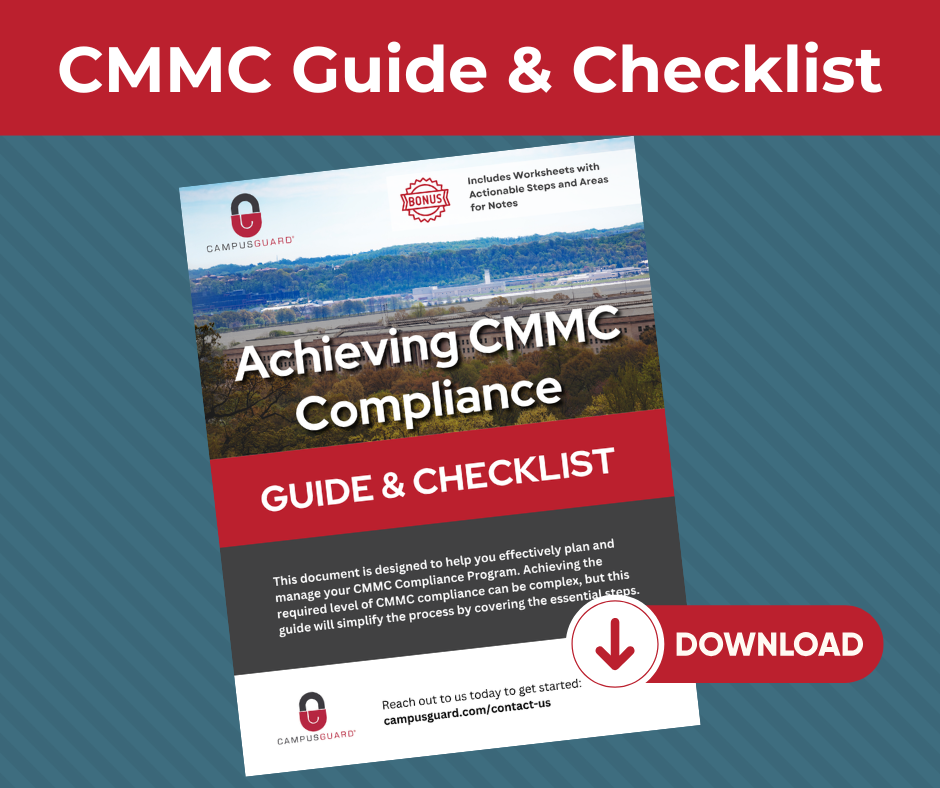Guidance for CMMCCybersecurity Maturity Model Certification
Supporting your journey to meet and maintain CMMC compliance

Elevate Your CMMC Compliance from Basic to Advanced
The CMMC combines various cybersecurity standards and best practices to ensure organizations are successfully protecting sensitive information and are capable of adapting to new and evolving cyber threats.
CMMC has many requirements. Reach out to us for a CMMC Compliance Assessment.
We Can Help You Prepare for a CMMC Audit
What CampusGuard Performs as an RPO
-
Gap Assessment
- Both Level 1 and 2
- Thorough review of your CMMC environment
- Assess your required controls (15 for Level 1/110 for Level 2)
- Identification of deficient controls and documentation
-
Readiness Audit
- Level 2 only
- Thorough review of your CMMC environment
- Audit of all 110 controls in detail
- Compliance report of all 110 controls
-
Advising
- Provide guidance in developing a CMMC environment
- Assist in the development of IT architecture, required CMMC documentation, and education of CMMC requirements, strategies, and processes
- Remediation/Post-assessment support
Access the CMMC Guide & Checklist
Is your organization ready for CMMC compliance? Download our CMMC Guide and Checklist to access:
- CMMC Basics & Overview
- The 3 CMMC Levels Explained
- Getting Prepared for CMMC Compliance
- CMMC Frequently Asked Questions
- CMMC Compliance Checklist & Sections for Notes
- Additional Help & Resources
CMMC Compliance Checklist
The process of reaching your required level of CMMC compliance can be cumbersome. CampusGuard is here to guide your organization through the nuances, but here are some steps to get you started:
-
Decide on Maturity Level
The type of information your organization handles and the size and sensitivity of the contracts in which you plan to participate will help you to establish which level of CMMC compliance you must achieve. -
Determine Where Federal Contract Information (FCI) and Controlled Unclassified Information (CUI) Is Stored
Finding where your organization is currently storing, using, or transmitting this data will help you better design a cohesive environmental scope. -
Build an Environment for FCI and CUI
Through the use of physical and logical separation, your organization will need to confine the spaces where FCI/CUI is stored, access, and shared. -
Create Documentation Around Your Scope
Complete documentation regarding the scope of your environment, exactly what falls into that scope, and who is responsible for each control within your System Security Plan (SSP) will need to be produced to your assessor. -
Develop Staff Training on Best Practices
During the process of developing your CMMC strategy, your organization will establish new policies for the use of FCI/CUI. All employees involved with the use of this information will need to be trained on these policies. -
Conduct Assessment
Assessing your SSP is the best way to find gaps in coverage and document your future plans to readdress them with a Plan of Action and Milestones (POAM).
For a more detailed CMMC Checklist, check out this free download, “Achieving CMMC Compliance Guide & Checklist.” This comprehensive guide provides in-depth information on CMMC, the Final Rule, the three maturity levels, answers to frequently asked questions, and an interactive checklist and useful templates to help you prepare for CMMC compliance.
Why Choose CampusGuard to Assist with CMMC Compliance Requirements?
At CampusGuard, we specialize in the intricacies and diverse environments of complex organizations needing to comply with CMMC. Our dedicated team prides itself on our expert accreditation, staying updated on the latest trends, and working alongside our clients with a personal approach.
Reach out to us to get started with a CMMC Compliance Assessment.

Related Products and Services
Our Experts Are Ready to Assist You with CMMC Compliance
As a CMMC Registered Provider Organization (RPO), CampusGuard is focused on assisting Organizations Seeking Certification (OSC’s) to prepare for CMMC compliance. Reach out to us today to get started.
Top CMMC Frequently Asked Questions
-
- Level 1: Foundational is aligned with FAR 52.204-21: Basic Safeguarding of Covered Contractor Information Systems (for companies with FCI only).
- Level 2: Advanced is aligned with DFARS clause 252.204-7012: Safeguarding Covered Defense Information and Cyber Incident Reporting. Requires compliance with NIST SP 800-171.
- Level 3: Expert is aligned with DFARS clause 252.204-7012: Safeguarding Covered Defense Information and Cyber Incident Reporting. Requires compliance with NIST SP 800-171 and NIST SP 800-172.
- Protecting sensitive information to empower and safeguard the warfighter.
- Upholding Defense Industrial Base (DIB) cybersecurity standards to address emerging threats.
- Promoting accountability while reducing obstacles to compliance with DoD requirements.
- Fostering a collaborative environment focused on cybersecurity and resilience.
- Building public trust through exemplary professional and ethical standards.
- CMMC Compliance for Higher Education
- Protecting Controlled Unclassified Information (CUI)
Key CMMC Compliance Steps for Research Universities
The CMMC final rule as a contractual requirement is now here. Learn steps to start building confidence in your CMMC program with CampusGuard.
CMMC Compliance Steps about the Key CMMC Compliance Steps for Research Universities

